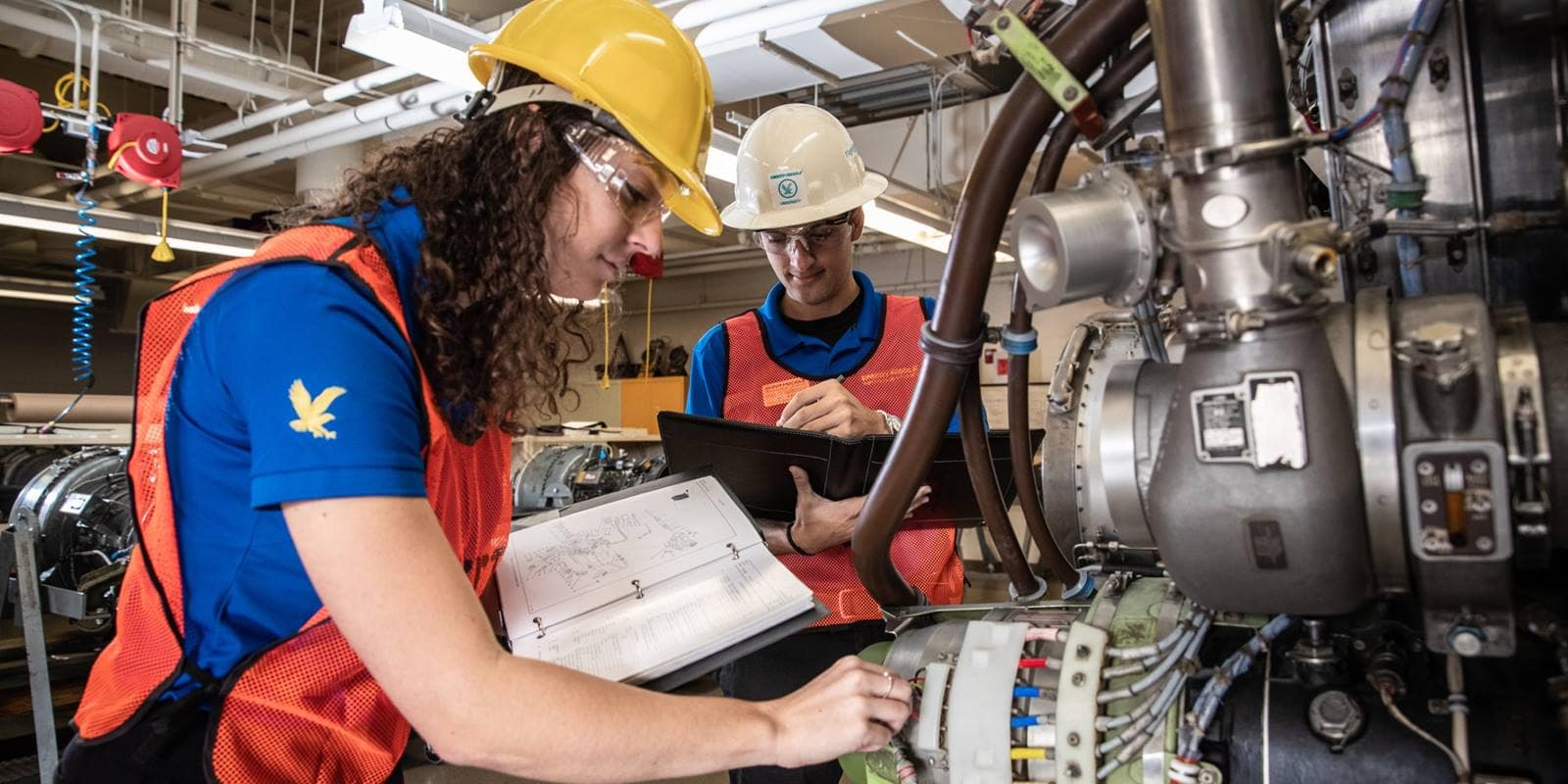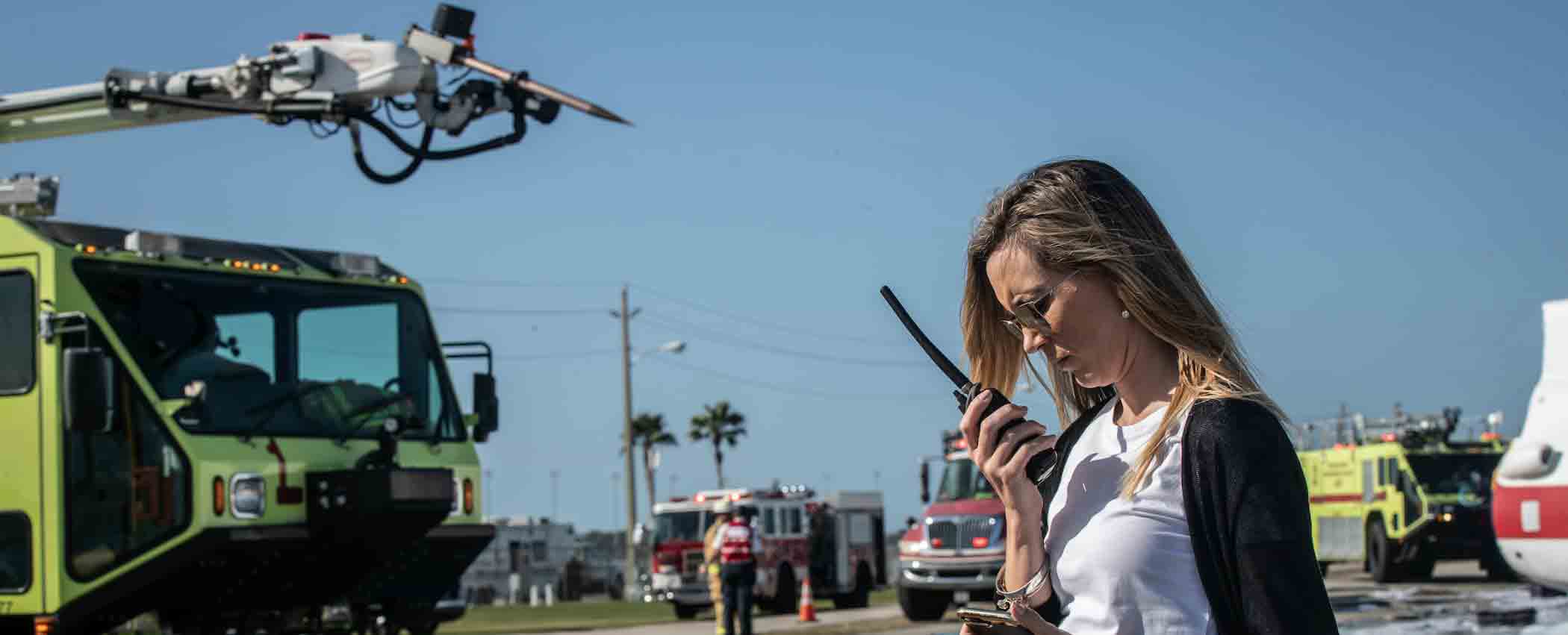
Master of Science in
Occupational Safety Management
The M.S. in Occupational Safety Management emphasizes safety challenges in many occupational settings, from aviation and manufacturing to military and government.
About the Master of Science in Occupational Safety Management
Whether you are looking to advance in your current position or seeking a career change, Embry‑Riddle’s M.S. in Occupational Safety Management (MSOSM) prepares you to make informed risk assessments, strategize accident prevention strategies and promote a safety culture within any institution.
Through rigorous academic experience, students acquire the knowledge, skills and abilities to succeed as a certified safety manager or leader in the safety, health and environmental fields.
Occupational Safety Management Career Opportunities
Careers and Employers
Embry-Riddle graduates are set to enter the workforce in top companies, including Delta Air Lines, Johnson and Johnson, The Boeing Company and Tesla, with a 100% placement rate within a year of graduation.
Graduates will be ready to take on environmental and occupational safety and health leadership positions, including:
- Directors of Safety
- Environmental Health and Safety Compliance Officers
- Loss-Control Managers
- Safety Managers
- Safety and Health Consultants
Occupational Safety Management Salary Information
Pursuing a Master of Occupational Safety Management from Embry-Riddle Aeronautical University provides graduate students with competitive salaries averaging $95,900 annually as of 2022.
DETAILS
This offering is available at the following campuses. Select a campus to learn more.
About Occupational Safety Management at the Daytona Beach, FL Campus
The Master of Science in Occupational Safety Management provides students with the theoretical foundation, research and application skills required to effectively prevent and control workplace safety, health and environmental hazards effectively and manage comprehensive occupational safety and health programs.
Students at the Daytona Beach Campus benefit from access to real-world aviation and safety operations with the added flexibility of completing some courses online. The MSOSM also offers an option in the field of Industrial Hygiene, the science and art devoted to anticipating, recognizing and controlling environmental factors or stresses arising in or from the workplace.
Professional Accreditation
The Master of Science in Occupational Safety Management is designated as a Board of Certified Safety Professionals (BCSP) Qualified Academic Program, and graduates are eligible to apply for the BCSP Graduate Safety Practitioner® (GSP) designation. The GSP designation is an alternate path to the Certified Safety Professional® (CSP), waiving the requirement to sit for the ASP exam. For information on the GSP, go to bcsp.org/GSP.
Occupational Safety Management Information
- Credits: 36
- Online or In-Person: In-Person
- Thesis: Thesis, Internship or Graduate Capstone
Helpful Links
- Tour our Daytona Beach Campus
- Discover the Department's Faculty
- Explore the Fields of Study: Aviation & Applied Science & Business & Security, Intelligence and Safety
- Find Related Clubs & Organizations
The Master of Science in Occupational Safety Management (MSOSM) provides students the theoretical foundation, research and application skills required to effectively anticipate, recognize, evaluate, prevent and control workplace safety, health and environmental hazards, as well as manage comprehensive occupational safety and health programs. The Industrial Hygiene Track will help students identify workplace hazards and work proactively to prevent them. Students will learn how to recognize potential hazardous exposures and mitigate them to provide a safe and healthy workplace environment.
The students at our Daytona Beach Campus benefit from access to real-world aviation and safety operations, plus the added flexibility of completing some courses online.
The Management Track is made up of courses encompassing safety-related topics, research and statistics. They address:
- occupational safety and health management
- hazard controls
- environmental protection
- industrial hygiene and toxicology
- human factors and ergonomics
- fire safety management
- disaster preparedness and emergency response
- systems safety and legislation
- litigation and compliance operations
These courses provide our graduate students with the necessary knowledge, skills and abilities to succeed as a safety and health manager and professional.
The Industrial Hygiene Track consists of courses encompassing industrial hygiene-related topics, research and statistics.
- Health and Safety Foundations
- Litigation & Compliance
- Physical Hazards
- Hazard Control Methods
- Industrial Hygiene and Toxicology
- Human Factors and Ergonomics
- Chemical Hazards and Analytical Methods
- Sampling and Analysis
Students can round out their program by choosing to do a thesis, a graduate capstone or participating in an internship. 36 credits are required for students completing a thesis, and 33 credits are required for those completing the capstone.
Each track of the Master of Science in Occupational Safety Management is designated as a BCSP Qualified Academic Program, and graduates are eligible to apply for the BCSP Graduate Safety Practitioner® (GSP) designation. The GSP designation is an alternate path to the Certified Safety Professional® (CSP), waiving the requirement to sit for the ASP exam. For information on the GSP go to https://www.bcsp.org/GSP.
Degree Requirements
| SF 520 | Occupational Health and Safety Foundations | 3 |
| SF 530 | Safety, Health and Environmental Legislation, Litigation & Compliance | 3 |
| SF 550 | Fire Safety Management and Disaster Response | 3 |
| SF 580 | Environmental Protection for the Safety, Health and Environmental Manager | 3 |
| SF 590 | Hazard Control Methods in Occupational Safety and Health | 3 |
| SF 600 | Occupational Safety and Health Management | 3 |
| SF 611 | Industrial Hygiene and Toxicology | 3 |
| SF 619 | Human Factors and Ergonomics | 3 |
| Total Credits | 24 | |
Research Core
| MSA 662 | Statistical Analysis for Aviation/Aerospace | 3 |
| MSA 670 | Research Methods in Aviation/Aerospace | 3 |
| Select one of the following Options | ||
| Option 1: Capstone | ||
| SF 691 | Graduate Capstone | 3 |
| Total Credits with Capstone Option | 33 | |
| OR Option II: Thesis | ||
| SF 700A | MSOSM Thesis I | 3 |
| SF 700B | MSOSM Thesis II | 3 |
| Total Credits with Thesis Option | 36 | |
Industrial Hygiene Track Requirements
| SF 520 | Occupational Health and Safety Foundations | 3 |
| SF 530 | Safety, Health and Environmental Legislation, Litigation & Compliance | 3 |
| SF 560 | Industrial Hygiene and Physical Hazards | 3 |
| SF 590 | Hazard Control Methods in Occupational Safety and Health | 3 |
| SF 611 | Industrial Hygiene and Toxicology | 3 |
| SF 619 | Human Factors and Ergonomics | 3 |
| SF 620 | Evaluation of Chemical Hazards and Analytical Methods in Industrial Hygiene | 3 |
| SF 640 | Industrial Hygiene Sampling and Analysis | 3 |
| Total Credits | 24 | |
Research Core
| MSA 662 | Statistical Analysis for Aviation/Aerospace | 3 |
| MSA 670 | Research Methods in Aviation/Aerospace | 3 |
| Select one of the following Options | ||
| Option I: Capstone | ||
| SF 691 | Graduate Capstone | 3 |
| Total Credits with Capstone Option | 33 | |
| OR Option II: Thesis | ||
| SF 700A | MSOSM Thesis I | 3 |
| SF 700B | MSOSM Thesis II | 3 |
| Total Credits with Thesis Option | 36 | |
Get Started Now:
Summary
36 Credits
Estimate your tuition by using the Tuition Calculator
View Financial Aid Information
Learn about our General Education
Find out about transferring credits to this degree
Learn more about our Veterans & Military benefits
View our Academic Calendar

About Occupational Safety Management at the Worldwide & Online Campus
Upon completing the program, focused skills and this specialized degree will distinguish graduates as astute and knowledgeable safety management professionals. With this distinction, graduates will be ready to take on occupational safety and health leadership positions.
MSOSM coursework prepares students for certification by the Board of Certified Safety Professionals (BCSP), allowing students to apply for Graduate Safety Practitioner ® (GSP)* designation.
The benefits of GSP designation are:
- Recognition for being on a path toward the CSP certification.
- Recognition for the level of preparation for professional safety practice.
- A waiver of the ASP examination requirement for CSP eligibility.
- A certificate awarding the GSP designation.
*BCSP and GSP details provided by bcsp.org/GSP
The MSOSM degree has also been approved by the Institute of Hazardous Materials Management (IHMM) as an Associate Safety and Health Manager (ASHM) Program. MSOSM graduates may apply for the ASHM credential upon graduation, as the ASHM designation is an important stepping stone to the accredited Certified Safety and Health Manager (CSHM) certification. Students who receive a degree from an approved ASHM institution must demonstrate two years of experience instead of four to sit for the CSHM exam.
Program Educational Objectives
- Apply a broad educational background combined with strong critical thinking, analytical and time management skills to lead, influence and achieve the OSH goals and objectives of their employers.
- Effectively communicate, collaborate and manage a professionally diverse and inclusive work environment.
- Manage and lead OSH organizations ethically and professionally.
- Engage in professional development and mentor others to demonstrate competency; ensure relevancy in knowledge, skills and new technologies; and maintain currency in changing industry trends.
- Anticipate, recognize, evaluate, prevent and control hazards to better ensure safe workplaces and develop best practices.
Student Learning Outcomes
Upon graduation, students in the Master of Science in Occupational Safety Management program will:
- Have the ability to identify, formulate and solve broadly-defined technical or scientific problems by applying knowledge of mathematics and science and/or technical topics to areas relevant to the discipline.
- Have the ability to formulate or design a system, process, procedure or program to meet desired needs.
- Have the ability to function effectively on teams that establish goals, plan tasks, meet deadlines and analyze risk and uncertainty.
- Have the ability to anticipate, recognize, evaluate, prevent and control workplace safety and occupational health hazards within numerous industries to protect people, property, the environment, and organizational operations.
- Have an ability to effectively manage occupational safety and health functions within a variety of industries.
- Have an ability to justify occupational safety and health programs, initiatives and control efforts through the use of business and risk management metrics, by maintaining compliance with applicable standards and regulations or through scientific evaluation of outcomes.
- Have an ability to effectively communicate and interact with persons at all levels within an organization and externally about occupational safety, health and environmental management.
- Have the ability to practice and perform in an ethical, moral, responsible and accountable manner in all aspects, but especially in the practice of safety, understanding the impact of technical and/or scientific solutions in global, economic, environmental and societal contexts.
- Have the ability to identify an occupational safety and health research problem; complete a thorough review of the scholarly literature; formulate and test hypotheses or research questions; collect and appropriately analyze qualitative or quantitative data; and interpret and report research findings using scientific judgment to improve the field of occupational safety and health or to provide solutions to occupational safety and health problem.
Professional Accreditation
The MS in Occupational Safety Management program is accredited by the ANSAC Accreditation Commission of ABET under the General Criteria and the Safety and Similarly Named Programs Program Criteria.
Occupational Safety Management Information
- Credits: 30
- Online or In-Person: Fully online
Helpful Links
- Attend a Worldwide Virtual Info Session
- Discover the Department's Faculty
- Explore the Fields of Study: Aviation & Applied Science & Business & Security, Intelligence and Safety
- Find Related Clubs & Organizations
DEGREE REQUIREMENTS
Core/Major
| SFTY 530 | Safety, Health and Environmental Legislation, Litigation & Compliance | 3 |
| SFTY 540 | Disaster Preparedness and Emergency Response | 3 |
| SFTY 570 | Fire Safety Management | 3 |
| SFTY 580 | Environmental Protection for the Safety, Health and Environmental Manager | 3 |
| SFTY 590 | Hazard Control Methods in Occupational Safety and Health | 3 |
| SFTY 600 | Occupational Safety and Health Management | 3 |
| SFTY 611 | Industrial Hygiene and Toxicology | 3 |
| SFTY 619 | Human Factors and Ergonomics | 3 |
| RSCH 650 | Research Methods and Analysis | 3 |
| SFTY 691 | Graduate Capstone Course | 3 |
| Total Degree Requirements | 30 | |
Get Started Now:
Summary
30 Credits
Estimate your tuition by using the Tuition Calculator
View Financial Aid Information
Learn more about the benefits of an Online Degree
Learn about our General Education
Find out about transferring credits to this degree
Learn more about our Veterans & Military benefits
View our Academic Calendar
Search Courses for this degree

RELATED DEGREES
You may be interested in the following degrees:





